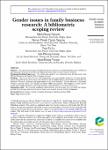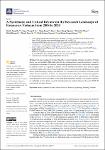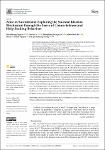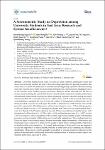Search
Author
- Manh-Toan Ho (2)
- Manh-Tung Ho (2)
- Quan-Hoang Vuong (2)
- Hung-Long D. Tran (1)
- next >
Subject
- Bayesian inference (1)
- China (1)
- corporate governance (1)
- depressive disorder (1)
- next >
Date issued
Search Results
Purpose
The current review aims to examine the growth trajectory, most influential documents, intellectual and conceptual structure of the literature regarding gender issues in family business research.
Design/methodology/approach
The bibliometric analysis was performed using 224 documents from 1991 to 2020 extracted from the Web of Science database.
Findings
The review finds that this field's knowledge grew exponentially during the last three decades, mainly after 2003 and the last several years. Based on the co-citation analysis, three major research lines are identified: “Women's challenges and opportunities in the family business”, “Gender diversity in the family business corporate board”, and “Gender and family SMEs management.” The temporal co-word analysis reveals th... |
This paper endeavors to understand the research landscape of finance research in Vietnam during the period 2008 to 2020 and predict the key defining future research directions. Using the comprehensive database of Vietnam’s international publications in social sciences and humanities, we extract a dataset of 314 papers on finance topics in Vietnam from 2008 to 2020. Then, we apply a systematic approach to analyze four important themes: Structural issues, Banking system, Firm issues, and Financial psychology and behavior. Overall, there have been three noticeable trends within finance research in Vietnam: (1) assessment of financial policies or financial regulation, (2) deciphering the correlates of firms’ financial performances, and (3) opportunities and challenges in adopting innova... |
On average, one person dies by suicide every 40 s. However, extant studies have largely focused on the risk factors for suicidal behaviors, not so much on the formation of suicidal thoughts. Therefore, we attempt to explain how suicidal thoughts arise and persist inside one’s mind using a multifiltering information mechanism called Mindsponge. Bayesian analysis with Hamiltonian Markov Chain Monte Carlo (MCMC) technique was run on a dataset of multinational students (N = 268) of an international university in Japan. Item 9 in the PHQ-9 was used to survey suicidal ideation. The associations among four main variables, namely, (i) suicidal ideation, (ii) help-seeking willingness (informal and formal sources), (iii) sense of connectedness, and (iv) information inaccessibility (represente... |
Given that mental health issues are acute in Asian countries, particularly Japan and Korea, and university students are more vulnerable to depression than the general population, this study aims to examine the landscapes of scientific research regarding depressive disorders among university students and evaluate the effectiveness of international collaboration and funding provision on the scientific impact in Korea, Japan, and China. Based on articles retrieved from the Web of Science database during the period 1992–2018, we found that the number of scientific publications, international collaborations, and allocated funds regarding depressive disorder among university students in China (97 articles, 43 international collaborations, and 52 funds provided, respectively) overwhelmingl... |




